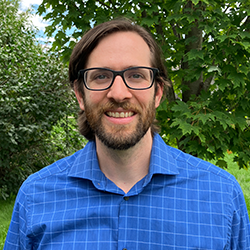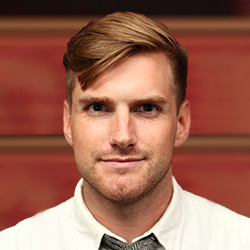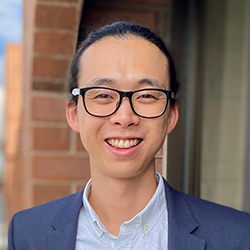
The Manulife Scholarship program offers three scholarships of $12,500 each annually to provide financial assistance to engineers returning to university for further study or research in an engineering field. Candidates must be accepted or registered full time in a Faculty of Engineering.
Applicants may only apply in one scholarship category per year.
Meet the 2023 recipients of the Engineers Canada - Manulife Scholarship recipients
Cameron Flude, B.Sc.E, P.Eng.

Carleton University
Doctor of Philosophy in Civil Engineering
“It is never too late to further your education. Although there are additional challenges to going back to school later in life, any working experience will be very valuable and help provide additional perspective to your studies or research.”
When people think of the destruction from earthquakes, they typically think of buildings collapsing due to damage to the structural elements. However, the non-structural components within buildings, such as partition walls, mechanical equipment, or shelving units, are susceptible to damage even during earthquakes that do not damage the structure of the building. Damage to non-structural components can be hazardous to occupants of the building and can also cause large financial losses. This scholarship will support Cameron Flude’s research to explore how suspended ceilings perform when subjected to earthquake motions from different types of buildings. As a practicing engineer, with 10 years of experience working in structural engineering, Flude’s practical knowledge will be the backbone of his research and provide him with a unique perspective. “I believe my research will help lay the foundation for a new generation of earthquake engineering research on non-structural components which will have a significant impact on future design practices, help to mitigate seismic risks in buildings, and create safer, more resilient buildings in Canada and around the world,” Flude says. For the duration of his studies, Flude has partnered with the National Research Council Canada to assist in updating guidelines for the seismic evaluation and upgrading of existing buildings and non-structural building components. This work has strengthened his understanding of existing seismic guidelines in Canada and around the world. In the future, Flude hopes to apply the knowledge he acquires to become a professor or researcher within a university, government agency or private company.
Taylor Martin, P.Eng.

University of Toronto
PhD in Mechanical and Industrial Engineering (Specializing in Healthcare Engineering Research)
“Taking the time to understand the problem, the needs of the user, and involving them in designing or testing a solution always leads to better results.”
Taylor Martin wants to show that both healthcare worker wellbeing and hospital budgets can benefit from an engineering approach to scheduling. Martin’s combined background in engineering and hospital operations inspired his work to seek solutions for these challenges. “Too often, in order to produce balanced budgets, hospitals overly constrain hiring ability and become chronically understaffed. These conditions exacerbate burnout and the dependency on overtime to provide necessary care,” Martin says. Studying Healthcare Operations Research in the department of Mechanical and Industrial Engineering at the University of Toronto, Martin’s research seeks to quantify and optimize the financial outcomes of structural and operational decisions about the health workforce at the clinical unit and hospital levels. Martin’s research is complemented with direct experience in the field. Martin previously worked at Michael Garron Hospital (MGH), redesigning their clinical workforce, and scheduling and staffing processes. Martin also previously managed MGH’s Nursing Resource Team, acquiring first-hand understanding of the challenges nurses face. Through Martin’s work, he hopes to help reduce workforce costs, build greater confidence in planning decisions, and create better quality jobs for health workers. “I believe the integration of engineering approaches and health systems management is key to addressing 21st century challenges,” Martin says.
William Szu-Wei Chen, P. Eng.

University of British Columbia
PhD in Chemical and Biological Engineering
“Designing an effective process is not just about getting the technology and the math right, it’s also about considering the local community, public perception and reception, and infrastructure health.”
Cleaning up water to return it safely to the environment or to provide for human consumption are challenges in developed and developing countries alike. After four years working in environmental consulting, William Szu Wei Chen is undertaking research on biological ion exchange for surface water treatment, specifically in removing natural organic matter to ensure that the water can be safely disinfected. The benefit of this method is that it requires less chemicals and maintenance compared to conventional options, making it particularly suitable for remote and small communities. “The water world is rife with examples of treatment solutions dropped into communities which were completely excluded in the design process and, sure enough, the system eventually fails and is abandoned,” William says. With equitable access to water being an ongoing issue in Canada and around the world, William is grateful for the opportunity to take on an engineering project that aims to make a positive social impact. Outside of his research, William is actively involved in the water sector, presenting at industry conferences and supporting community water operator training events. These opportunities have informed the direction of his research project, ensuring that the results are relevant to the needs of the communities that the project is meant to serve. “My hope is to advocate for a holistic worldview in engineering, both in my own practice, and in what I teach to future engineers as an instructor and mentor,” William says.


